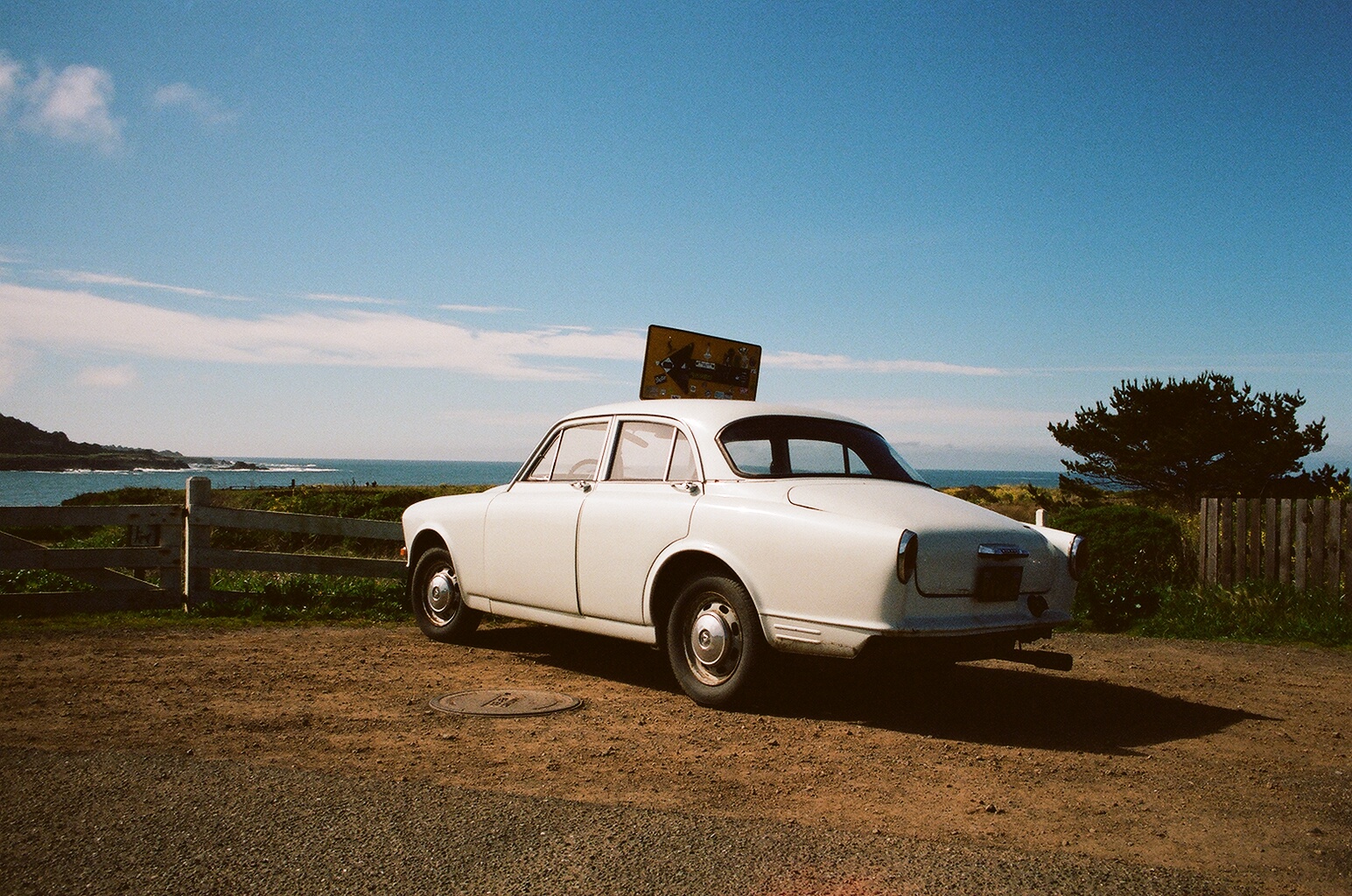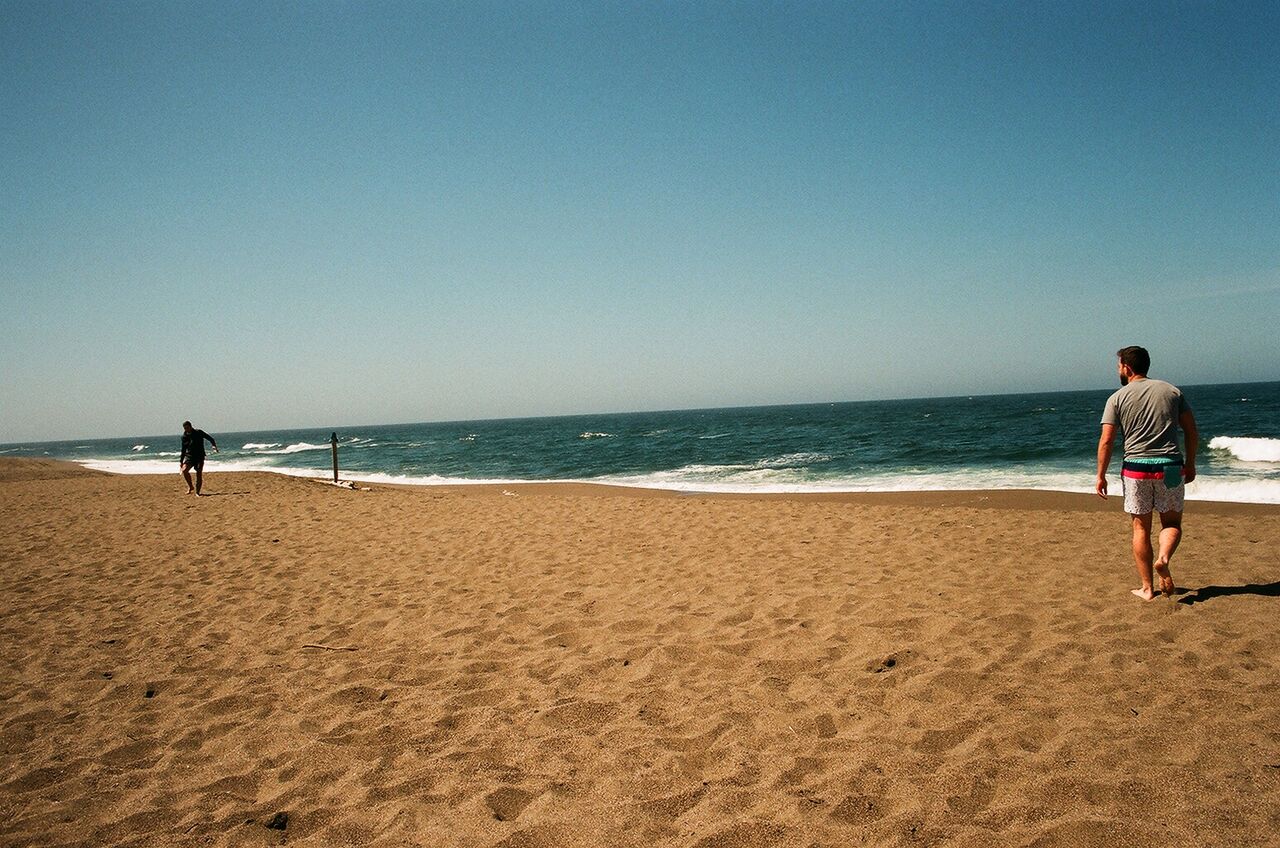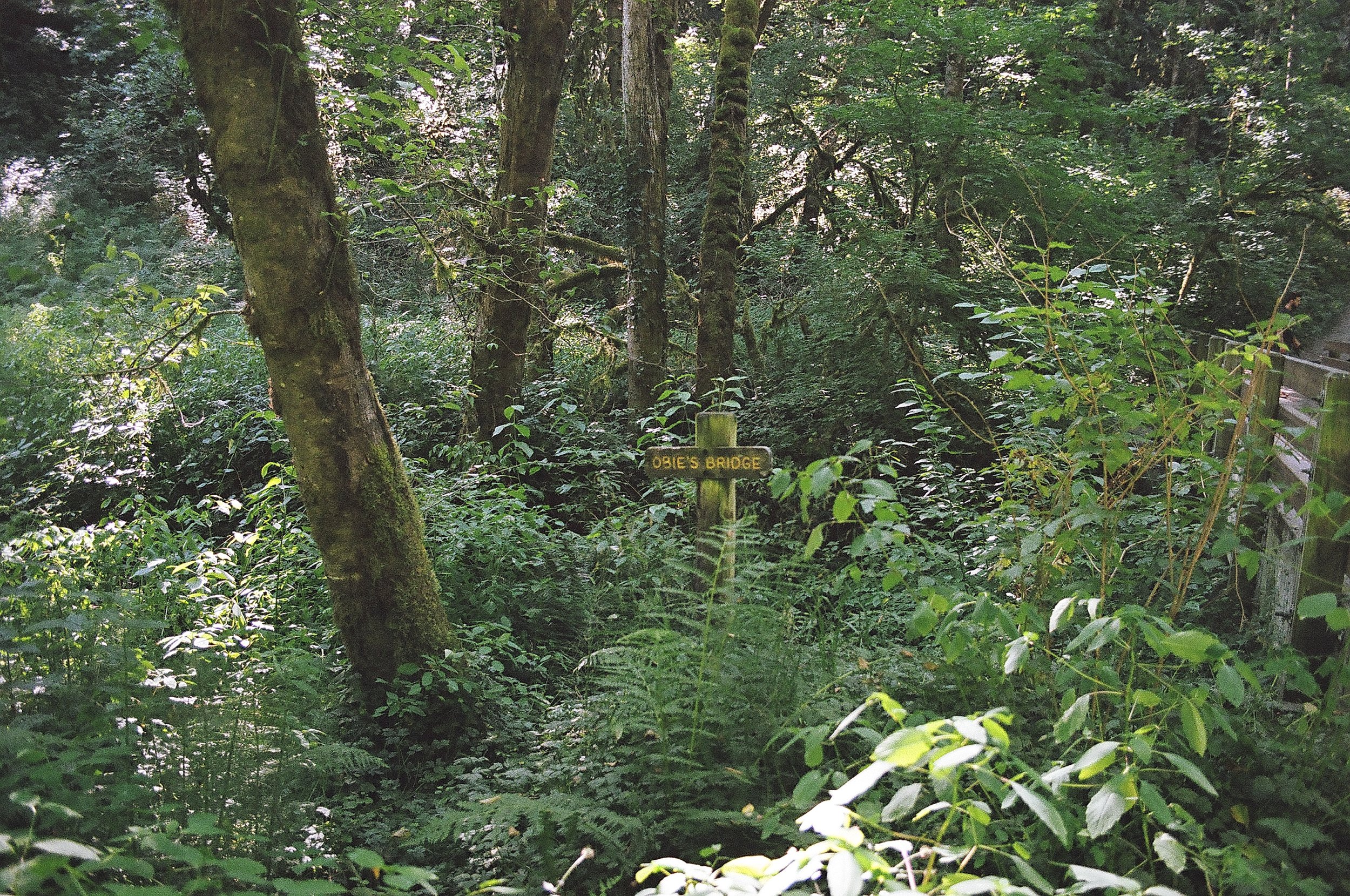Ice plant bent under their bare feet. The ice chest hovered between them, swaying with their stride. They moved in unison, one practiced for a lifetime, maybe more. Then came the crest of the dune. The Pacific, bright blue in the ripping winds, starch white where she broke, stretched out before them. It was there, beyond the brink, at that first sighting,that it struck. It always had. Their children stretched out behind them in a straggling progression, their wives brought up the rear, every hand towing supplies for the day ahead. But it was they who stopped, who the sea struck. They didn’t understand the feeling; they never spoke of it to one another.
The families broke camp some ways down the shore. Two open-air day tents, two tables, the massive ice chest, bags of food, and Frisbees, balls. As soon as camp was set, the wives brought out the spreads of food, the men opened four bottles of beer, and the children ran for the sea.
The Frisbee flew flat, cutting through the wind. The younger spun as he caught it, fired it back off into the breezes. The older caught it. Snapped his wrist. Away it went, low and fast to the sand. It felt good to him, to stretch his muscles, to move, to cut, his feet gripping in the sand. It felt good to breath the sea air. The Frisbee was coming back now, black plastic arcing high, and his eyes followed it, his arm ready to jut out. But something tore down his spine then, a cold wash. The Sun flared and everything was light. The older bent over and shielded his eyes. He took a deep breath in, then out. The sound of the disc hitting the sand made him open his eyes. The older scowled. The disc was different. It was no longer plastic, no longer solid. What rested before him was open in the middle, a doughnut. It had no ridge along the outer edge, this disc was thin, flat across the whole way through. And, on top of it all, the disc was copper. The older picked it up from the sand and examined it. He turned around and started.
There were men. Hundreds of them. They wore armor that shone in the light of the afternoon. Old-timey leather sandals. And they wore swords, short swords that hung from their belts. The older watched them mill about, cutting wood, tending fires.
“Come on then,” a voice yelled.
He looked up. He knew that voice.
It was the younger, or someone so the like he couldn’t help but stare. The young man’s hair was long. Braids of different lengths tossed in the ocean breeze. He was the same height, maybe an inch or two wider in the shoulders. His teeth were dulled and different, yellowed, and yet, he recognized the smile; would have recognized it anywhere. It was his brother. The same armor that the other men wore stretched across his chest. And, at his side, a leather scabbard swaddled a short sword.
The young man motioned for him to get on with it. He looked down at the discus in his hand. It was heavier than a Frisbee. The hammered metal was cool to the touch. The older turned it in his hand, enjoying the glint of sunlight that played of its surfaces. Suddenly, just as suddenly as the sun flare and the changing of the times, he understood it. More than that, he knew it: knew the weight, the feeling of it in his hand. He kept it flat, turned his body from the hips, churning the sand under his foot as he turned, flicked his wrist, and released. The discus flew true.
The young man down the beach smiled. The older recognized it. It was the same arrogant smirk he’d known his whole life. But now things were blurring. Which life? They threw back and forth, laughing, trying different tricks: spinning, under the leg, catching behind the back. The camp behind them grew still, the murmurs of the men sitting about the fires echoed out towards the waves. Spots of laughter ran up the cliff sides, trickling back down as the sky turned a myriad of shades of red and pink. The young man jogged up the beach. His smile was still wide.
“Let’s sit,” he said.
The older couldn’t keep a hand on whether the language they were speaking was English. He understood the words. They flowed freely from his mouth. Yet, it wasn’t. The sounds were strange.
“Ahhh,” the younger sighed. They sat on a crop of beach, an edge of dry sand, before the shore plummeted towards the sea, where waves hissed ever upward.
“This is not so bad a place to die.”
He said it plainly without irony. No hint of melodrama. Instead, there was the joy of life. There was sorrow, yes, but it was sorrow at seeing the world go. It was, the older thought, the most beautiful and warm of sorrows that exist in the universe. And, without thinking anything of it, looking out over the sea, the older replied, “As fine as any.” They were his words and they weren’t—as though this were a play, as though it had been played out. But this was happening; this was now. The older smelled the sweat on his skin and his brothers, smelled the salt of the sea and the cooking fires behind them. He felt the callus on his feet, the worn arch between his thumb and forefinger on his sword hand, his left hand—the same hand he threw Frisbees on the beach with his family and their food and their ice chest.
They watched the Sun set in silence, until the light from the fires was only matched by the moon. The younger grew solemn then. The joy he had worn in the sunlight was gone.
“We should try to sleep.” He said.
The older rested his head in the sand beside one of the fires. An old man was speaking, whispering, singing a story. It weaved in and out of the flames. It soared before the moon, hid amongst the clouds. It was a story of old things. The older drifted off before the end.
He awoke to drums. The thumping quickened his heart. All over camp, men were running about, calling out orders in that peculiar tongue. The younger came out of the chaos, striding evenly, a spear in each hand.
“Here,” he said.
He tossed the spear casually and the older caught it by the wooden shaft.
“It’s time.” He put on a somber smile.
They joined the ranks setting up on the sands. They shouldered their way to the front. It was still dark, but the sunrise was creeping through. The older looked out to sea. Shadows dotted the dark blue waters. He had to check his eyes. He rubbed them with his free hand and looked again. Hundreds, maybe a thousand. He cursed to himself.
The younger smiled at that.
“So many,” he nodded.
The older looked over. The thin metal discus hung from the younger’s belt, just behind his sword.
“What’s that for?”
The younger smiled.
“They’ll never know what hit them.”
And the older smiled for it.
But as the ships crawled closer to shore, he wanted to run, wanted to pull his brother by the arm, somewhere else, some place safe. His legs would not listen. His hand wouldn’t even drop the spear.
It was an hour before the sun rose into view. They could see the ships now. The sea churned white at their bows. The shapes of men watching from the decks made the older clench his jaw. The enemy was no longer abstract. There he was. And he was coming.
Yells arose along the lines. They held position at the height of the beach, the crest of the hill. The invaders would have to charge uphill, have to run with armor and shield and sword up the crumbling sand, the weight of the sea still heavy on their clothes. Then they would charge.
The world filled with sound. Ships landed up and down the lines. Men with foreign tongues screamed out in fury. The old man who spun stories fell face first in the sand, an arrow protruding from his belly. The older felt hatred as he felt love. He looked over to his brother, whose jaw was set, whose arm was loose, yet firm, just as their father had taught them. The younger looked back at him. The eyes were the same, the older thought. The eyes, the stance. The younger nodded. The line cried out. They charged. The world rolled deep. It shook the older. The crash of men, the hiss of waves. Nothing was thought. All happened as nature intended, as thoughtless and unintentional as a comet striking a planet. All shook. Red hot blood burned and spewed and spoke measures.
The older opened his eyes. A Frisbee lay in the sand before him. Black plastic. A headache came and went. It staggered him. The younger stood down the beach calling to him. The older met his eyes and the younger stopped calling. They stared at one another for some time, then out to the sea. That feeling was back.








































